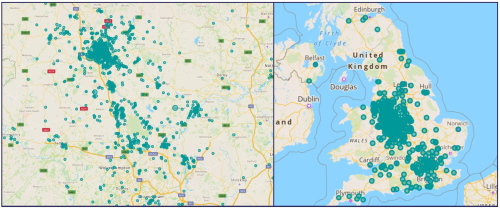Public and community engagement
External engagement is central in Keele’s Strategic Plan and Mission, embedded in education and research, not pursued as a third mission. Keele’s leadership structures ensure that that high quality public engagement practice is recognised and rewarded as a mainstream activity.
Keele’s refreshed KE Plan provides the framework for public engagement in the context of an landscape transformed through our Keele Deals agreed with local civic partners. It encompasses seven broad areas of impact can (see image below) each demanding a powerful integrated institutional response which extends beyond light-touch public engagement and knowledge-exchange. These provide ever growing opportunities for researchers and students to work with local partners and communities to address the needs of local communities and wider.
Keele's engagement priorities and contribution areas
Priorities:
- Economic growth
- Low carbon transitions
- Social inclusion
- Security and justice
- Digital transitions
- Health and wellbeing
- Cultural regeneration
Contribution areas:
- Collaborative R&D and innovation
- Resources and funding management
- Participatory research and community engagement
- Quantitative data analysis
- Facilities, infrastructure and technology
- Convening role
- Governance and policy insight
- Skills and workforce
- Events, festivals and visits
- Activism and volunteering
- Organisational support
- Networking building
Strategy
Institutional context
Encouraging impactful external engagement is central to Keele University’s Strategic Plan and Mission, embedded in our education and research, and our organisational support frameworks. The University has played a leading role in this area nationally.
Institutional leadership is embedded in our governance structures for research and education and built into mainstream academic planning.
Internal governance arrangements for external engagement
| Impact areas | Regen & economic growth | Environmental transitions | Social inclusion | Security and Justice | Digital transitions | Health and wellbeing | Cultural regeneration |
|---|---|---|---|---|---|---|---|
| Keele Deals | Economy | Economy | Culture | KD Recovery | Economy | Economy | Culture |
| Culture | Recovery | Recovery | Health | Health | Recovery | ||
| Recovery | Recovery | Recovery | |||||
| Institutional Convener | Vice Chancellor | Deputy Vice Chancellor | Director of Keele Institute for Social Inclusion | Pro-Vice Chancellor (Research & Innovation) | Vice Chancellor | Executive Dean, Medicine and Health Sciences | Director of Institute for Social Inclusion |
| Lead Institute | All | Institute for Sustainable Futures | Keele Institute for Social Inclusion | Keele Institute for Social Inclusion | Digital Society Institute | Institute for Global Health | Institute for Social Inclusion |
In 2016 we adopted the National Co-ordinating Centre’s manifesto for public engagement, signalling an intent to move beyond individual centres of excellence and wholeheartedly embrace public engagement, and leading to two major UKRI-funded institutional development projects.
Since 2017 the University has developed, through co-production, a number of focused ‘Deals’ with Civic partners, to identify needs and deliver regional impacts, and further strengthened the environment for engagement through the KE Concordat evaluation and gap analysis and action plan.
Keele’s KE Plan provides the current framework for all external engagement, and encompasses the commitments made to local partners since 2017 in strategic agreements called the Keele Deals (Economy, Culture, Health and Recovery), and includes the institutional improvement priorities identified through the KE Concordat and Keele’s Cultural Strategy.
The period covered by this narrative encompasses the pandemic and post-pandemic period, including the development of the Keele Deal | Recovery, which built on our initial emergency responses.
Equality, Diversity and Inclusion (EDI)
Equality and diversity has been identified as a key area for development. Our approach has been to support two forerunner areas of public engagement - Public and Patient Involvement and Engagement (PPIE) and Public Arts.
The EDI journey for PPIE started with Keele’s membership of the National Institute for Health Research’s (NIHR) Race Equality Public Action Group, followed by the delivery and evaluation of pilots for the NIHR’s newly developed Race Equality Framework for PPIE. A Faculty Race Equality Ambassador for PPIE was appointed, to enhance engagement with underserved communities. Keele is highlighted as an NIHR case study. Membership of Keele’s PPIE team has fundamentally changed, with 50% now from ethnic minority communities.
ArtsKeele makes a significant contribution to the area’s cultural landscape (113 cultural outputs in 21/22). As part of the Keele Deal, it has played a central role in supporting diverse artists in the cultural regeneration of the Potteries, and in creating a more inclusive environment for Keele’s increasingly diverse student and staff base. Strong, British and Black, a collaboration with Staffordshire-based Kwanzaa Collective UK was the first of a series of cultural programmes, which over the last two years has seen 50% of concerts and 75% of exhibitions involving artists from previously under-represented backgrounds.



